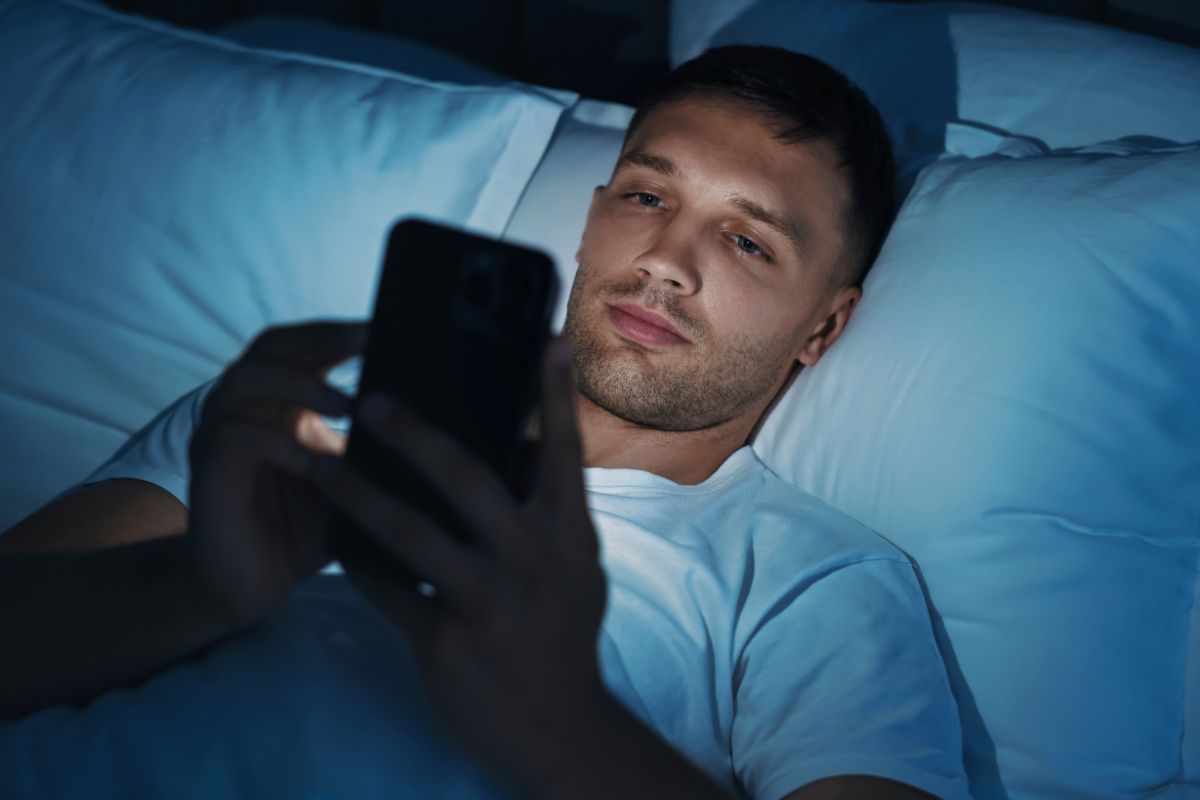OK, I’m going to be totally honest right now. Tuesday night was a total disaster. Didn’t sleep a wink until after two. Why? Because I’d spent the last hour preoccupied with my tablet, watching some old nonsense on Netflix, and then picked up my phone to take a peek at Instagram “just quickly”, you know how it is. Three hours afterwards, I’m still wide awake and staring at the ceiling.
Long story short, I wasn’t being overly dramatic. Those glowing screens had truly messed up my sleep. If, like me (which you almost certainly are, to be fair), this might explain why you’re knackered all the time despite spending ages in bed.
Your Phone is Playing Tricks on Your Brain
Here’s what’s happening. Blue light – that’s the stuff coming out of your phone, laptop, telly, or any screen – is brilliant during the day. Keeps you alert, stops you from falling asleep at your desk. But at night? Complete disaster.
See, your brain makes this hormone called melatonin. Think of it as nature’s sleeping pill. When it gets dark, melatonin kicks in and makes you drowsy. Simple system that’s worked for thousands of years.
But blue light? It tells your brain to stop making melatonin. Harvard boffins found that blue light blocks melatonin production for twice as long as other colours. We’re talking three hours versus ninety minutes. Three bloody hours!
So when you’re scrolling through TikTok at half ten at night, your brain thinks it’s still daytime. No wonder you can’t drop off.
The Real Damage Goes Beyond Just Falling Asleep
I used to think the problem was just taking longer to nod off. Wrong. Completely wrong.
Recent research shows blue light doesn’t just delay sleep, but it wrecks the quality too. Scientists found people exposed to blue light before bed got significantly less deep sleep. And deep sleep is when all the good stuff happens. Your body repairs itself, your brain sorts through the day’s memories, and basically, it does all the housekeeping.
Without proper deep sleep, you wake up feeling like absolute rubbish. Even after eight hours. Been there, done that, got the T-shirt.
College students in one study had their melatonin levels slashed by 55% after just two hours on an LED tablet. More than half of their natural sleep hormone, gone. Just from watching Netflix on an iPad.
It’s Everywhere (And Getting Worse)
The really annoying bit? Blue light is everywhere now. Every LED bulb in your house pumps it out. Your computer monitor, your smartphone, even your smart TV. We’re drowning in the stuff.
Twenty years ago, we had warm yellow bulbs that naturally dimmed as evening approached. Now? Bright white LEDs everywhere, tricking our brains into thinking it’s perpetual daytime.
How Blue Light is Secretly Messing with Your Sleep isn’t just about phones either. It’s the whole modern environment. We’ve basically built a world that fights against natural sleep patterns.
The timing makes it worse. Your body starts preparing for sleep around sunset. But we’re hitting ourselves with blue light well into the night. Like drinking espresso at bedtime and wondering why we can’t sleep.
What I Noticed When I Started Paying Attention
Once I learned about this blue light business, I started connecting the dots. Those nights when I’d been on my phone until late? Terrible sleep. The evenings I’d switched everything off early and read a proper book instead? Slept like a baby.
The research backs this up completely. Studies show blue light increases the time it takes to fall asleep whilst making you feel more alert. So you’re tired but wired. Knackered but can’t switch off. Horrible combination.
But here’s the thing: I also noticed I felt sharper during late-night screen sessions. More mentally alert. Which explains why you get sucked into endless scrolling. Your brain thinks it needs to stay awake and focused.
Proper Solutions That Don’t Involve Living Like a Monk
You don’t need to bin all your gadgets. I’m not suggesting you go full Luddite. But there are simple changes that make a massive difference.
Those amber glasses that filter blue light? They actually work. Proper scientific studies prove they prevent sleep disruption from screens. Look a bit daft, but who cares if you sleep better?
Most phones have blue light filters now. iPhone calls it Night Shift; Android has Night Light. Turn them on. The screen goes slightly orange after sunset, which is exactly what you want.
But honestly? The best solution is just switching off earlier. I know, I know, it’s boring advice. But nothing beats it. Two hours before bed, screens go off. Read something, have a bath, chat to your partner. Revolutionary stuff.
Change your light bulbs, too. Swap those harsh white LEDs for warmer ones in bedrooms and living areas. Use table lamps instead of overhead lights in the evening. Create an environment that helps your body prepare for sleep.
The Reality Check
How blue light is secretly messing with your sleep isn’t some wellness trend or pseudoscience nonsense. It’s proper, peer-reviewed research showing our modern lifestyle fundamentally conflicts with human biology.
Your smartphone is basically a miniature sun you hold inches from your face right before trying to sleep. When you put it like that, it sounds completely barmy, doesn’t it?
The solutions aren’t complicated or expensive. They just require admitting that maybe, just maybe, that last Instagram scroll isn’t worth feeling like death the next morning.
Since I started taking this seriously and using blue light filters, switching off earlier, and changing my evening routine, I sleep so much better. Wake up naturally instead of feeling like I’ve been hit by a bus.
Your sleep matters more than you think. And protecting it from blue light interference is one of the easiest health improvements you can make. Trust me, your future well-rested self will be absolutely chuffed you bothered.






